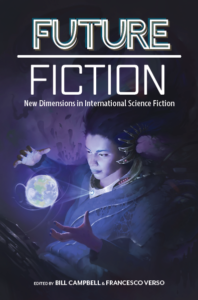 edited by Bill Campbell and Francesco Verso
edited by Bill Campbell and Francesco Verso
April 17, 2018
310 pages
If you’ve been looking for a superb collection of speculative fiction from around the world; fiction that interrogates humanity’s technological, moral, and, evolutionary trajectory; fiction that doesn’t hesitate to probe our darkest fears and secret desires– if you’ve been looking for something like that, then I’m happy to say that you’re in luck. It’s coming out in April from Rosarium Publishing and it’s called Future Fiction: New Dimensions in International Fiction. Edited by Rosarium’s Bill Campbell and Future Fiction‘s Francesco Verso, this collection brings together speculative fiction that was originally published by Verso’s Italian press. Here’s the table of contents:
-
- James Patrick Kelly – Bernardo’s House (USA)
- Nina Munteanu – The Way of Water (Canada)
- Carlos Hernandez – The International Studbook of the Giant Panda (USA-Cuba)
- Swapna Kishore – What Lies Dormant (India)
- Michalis Manolios – The Quantum Mommy (Greece) – translated by Manolis Vamvounis
- Clelia Farris – Creative Surgery (Italy) – translated by Jennifer Delare
- Tendai Huchu – Hostbods (Zimbabwe)
- Liz Williams – Loose Strife (UK)
- Ekaterina Sedia – Citizen Komarova Finds Love (Russia)
- Pepe Rojo – Grey Noise (Mexico) – translated by Andrea Bell
- Xia Jia – Tongtong’s Summer (China) – translated by Ken Liu
- Efe Tokunbo – Proposition 23 (Nigeria)
There’s speculative fiction, and then there’s speculative fiction that’s been kicked up several levels. You’ll find the latter when you read stories like “Bernardo’s House,” “Creative Surgery,” “Hostbods,” and the absolutely brilliant “Proposition 23.” As with any good collection of speculative fiction, you’ll find a range of stories, from sci-fi and fantasy, to magical realism and horror, and various combinations thereof. That, to me, is what makes “speculative fiction” such a fascinating and elastic label: it encompasses a wide range of literary approaches and encourages us to see these stories in terms of what they say about humanity’s future and its destiny. From Russia and India, the UK and Mexico, Italy and Greece, these stories exhibit the breadth and variety of speculative writing across cultures and languages.
Some of the stories, including “Bernardo’s House,” “The International Studbook of the Giant Panda,” “The Quantum Mommy,” “Hostbods,” “Grey Noise,” and “Proposition 23,” focus on the complex and often troubling intersection of humans and machines. “International Studbook,” “Grey Noise,” and “Proposition 23” feature human characters who interface with some sort of AI or network that chips away at their sense of sovereignty and individuality. “Bernardo’s House,” and “The Quantum Mommy” tell the stories of a house-linked robot and a malfunctioning teleporter, respectively, and the kinds of philosophical and practical problems that arise when it’s no longer clear who is human/who is the original human. “Hostbods” creatively takes up the transfer-of-consciousness trope and explores it in a socio-economic context, while “Tongtong’s Summer” addresses an aging population’s attempt to use human-controlled robots as caregivers.
Other stories, like “Creative Surgery” and “What Lies Dormant,” straddle sci-fi and magical realism, with characters able to weld together body parts or gather/transfer “life force” because of modified genes. Despite their different settings (Italy and India), both stories offer dystopian visions of a warped near-future in which genetic modifications and adaptations expand the realm of human ability.
“Citizen Komarova Finds Love” is the most magical-realist story of the collection, where objects in a consignment store take on a life of their own each night, while Citizen Komarova meets every so often with the only survivor of a regiment fighting in the Russian Revolution. “The Way of Water” imagines the tragic consequences of rainwater being controlled by international corporations, and “Loose Strife” tells the story of a shattered woman whose love for and care of a “baby” is touching precisely because she refuses to acknowledge the true nature of that baby.
These are the kinds of stories that will drive you to seek out more to read from each of these writers. So prepare your TBR stack- it’s about to get very, very tall.
